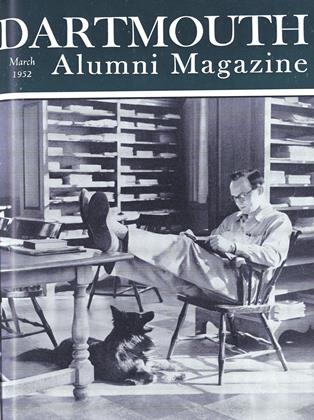A GERMAN named Kurt W. Marek has, for reasons which escape me, written a popular account of archaeology under the pseudonym of C. W. Ceram. This book, Gods, Graves, andScholars, published by Knopf, reveals many dramatic stories about buried cities and buried treasure. His aim is to portray for the layman the exciting, fascinating, and dramatic qualities in archaeology. In his account of Herculaneum and Pompeii, of Schliemann's excavation of ancient Troy, of Howard Carter's discovery of Tutankhamen's tomb, of the wonders of Baby- lonia and Sumeria (dug up by T. E. Lawrence and Leonard Wooley), and of the mighty empires of the Toltecs, Aztecs, and Mayas, the reader will not fail to be thrilled and excited.
William Carlos Williams is a poet whose poetry baffles many, but his Autobiography, published by Random House, will interest most readers. He is a thoroughly unconventional person, though with good taste he reveals none of his love life. His portrayal of life in the early medical schools, of the French Hospital in New York (now vanished), of Paris and Europe, and of the avant garde, consisting of such people as Charles Demuth, Gertrude Stein, Man Ray, Ezra Pound (most illuminating on poor Pound), T. S. Eliot (the icicle which got away), and Edward Steichen, are quite amusing and written with penetration. Williams has spoken twice at Dartmouth, and has lectured all over the country. A fellow poet, Robert Frost, is not mentioned, and it is most unlikely that their paths will ever cross, as they use entirely different idioms to express their views on life.
The story of the syndicate, Murder,Inc., by Burton B. Turkus and Sid Feder, makes blase reading for a generation as complacent about crime as ours. If we do not actually condone crime and political corruption, we accept it complacently as a natural and inevitable part of the gen- eral picture of life in these United States. This may well prove to be our undoing, for unless our general morality is raised we will be in no position to face the ruth- less, powerful, and implacable enemy (Russia and China) which we are now facing. The criminals herein described committed murder time after time, raped, assaulted, stole, lied, and flourished as they do all over this country at this hour, because politicians, police and other officials are in the trough grabbing all the bloodstained money in sight paid them by the criminal syndicates. These crim- inals are seldom convicted as they gener- ally control the law, and their betrayal of all human decencies is really astounding in a country as smug as ours. I personally applaud the recent statement of the Cath- olic hierarchy against our corruption and low morals, which, in my opinion, are a greater danger to our security and well being than the menace of communism.
Lovers of painting will enjoy Robert Coughlan's The Wine of Genius: A Lifeof Maurice Utrillo, issued by Harper in 1951. This is an expanded version of an article in Life on this crazy and alcoholic genius. The book contains a rather nostal- gic view of Montmartre, a sympathetic picture of Utrillo's mother, Suzanne Vala- don (his father is unknown), and an in- teresting account of Modigliani. (For fur- ther information on Modigliani see Jean Cocteau's little book on him issued by Fernand Hazan in Paris).
Frank Dobie knows the Southwest, and this includes northern Mexico. One of the best books I have read in a long time is his Tongues of the Monte (Little, Brown), telling in beautifully written prose the folkways, the wisdom and the way of life of the rancheros and vaqueros who inhabit this strangely elemental coun- try. The book has gone into several edi- tions.
Any reader interested in the American Protestant religions will find in George M. Stephenson's The Puritan Heritage (Macmillan) a wealth of information. He states thait the key to a study of American religion "is the understanding that the worship of God in spirit and in truth is in- separable from the cause of civil liberty." I find this consoling, and also find his chapters on the Quakers, Methodists, Uni- tarians, revivals, Masons, the American Bible Society, etc., full of facts, if not very well written. The author gets an A for effort.
Try re-reading Nostromo by Conrad, AShepherd's Life by Hudson, Disenchant-ment by C. E. Montague, and Walden by Henry David Thoreau. I will continue to recommend each month a few well- tried old books that stand the test of time.
 View Full Issue
View Full Issue
More From This Issue
-
 Article
ArticleAround the World in Fifty Books
March 1952 By JOHN HURD '21 -
 Article
ArticleTelevision and Education
March 1952 By EDWARD LAMB '24 -
 Class Notes
Class Notes1918
March 1952 By ERNEST H. EARLEY, DONALD L. BARR, RICHARD P. WHITE -
 Class Notes
Class Notes1929
March 1952 By F. WILLIAM ANDRES, EDWIN C. CHINLUND, JACK D. GUNTHER -
 Article
ArticleThe Undergraduate Chair
March 1952 By Conrad S. Carstens '52 -
 Class Notes
Class Notes1923
March 1952 By TRUMAN T. METZEL, COLIN C. STEWART 3RD
HERBERT F. WEST '22
-
 Article
ArticleHanover Browsing
May 1940 By HERBERT F. WEST '22 -
 Article
ArticleHanover Browsing
March 1947 By HERBERT F. WEST '22 -
 Article
ArticleHanover Browsing
December 1947 By HERBERT F. WEST '22 -
 Article
ArticleHanover Browsing
May 1948 By HERBERT F. WEST '22 -
 Books
BooksTHE WINOOSKI,
June 1949 By Herbert F. West '22 -
 Article
ArticleHanover Browsing
December 1953 By Herbert F. West '22
Article
-
 Article
ArticleMoosilauke Holdings Enlarged
NOVEMBER 1965 -
 Article
ArticleThe Trustee Elections
June 1981 -
 Article
ArticleDiary of a Freshman
March 1933 By A. P. Butler '36 -
 Article
ArticleResponse to a Review
OCTOBER 1971 By ALLAN W. CAMERON '60 -
 Article
ArticleDartmouth 20, Brown 0
November 1960 By DAVE ORR '57 -
 Article
ArticleThe Yusens' Wild-blue Yonder
March 1977 By FRITZ HIER '44


